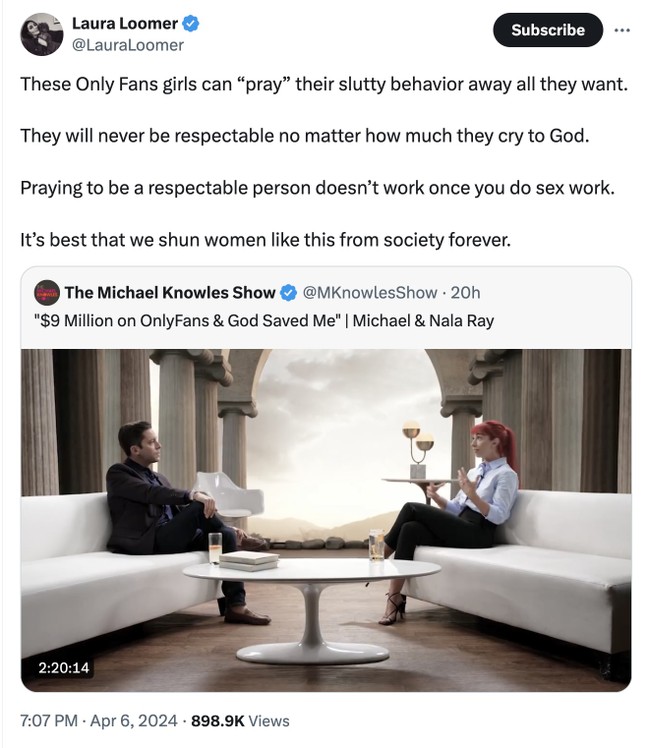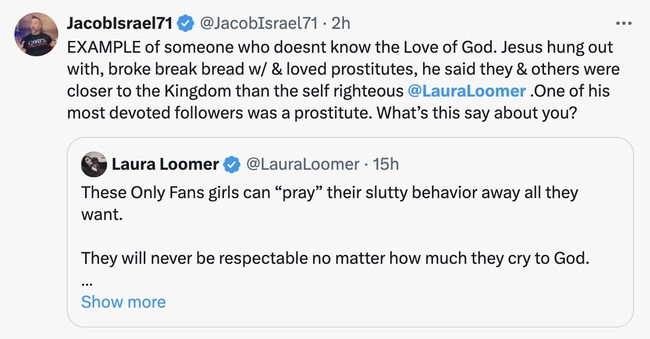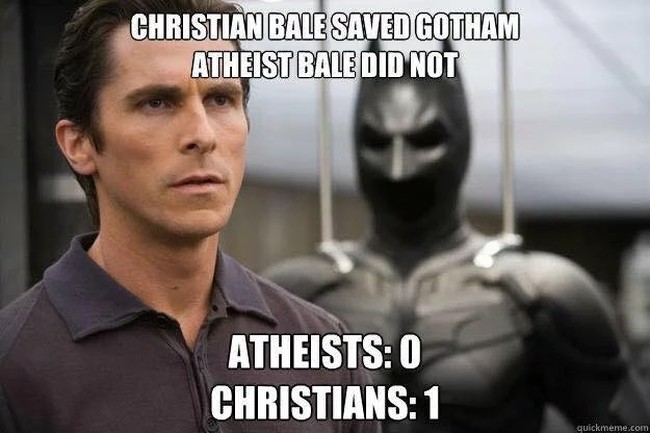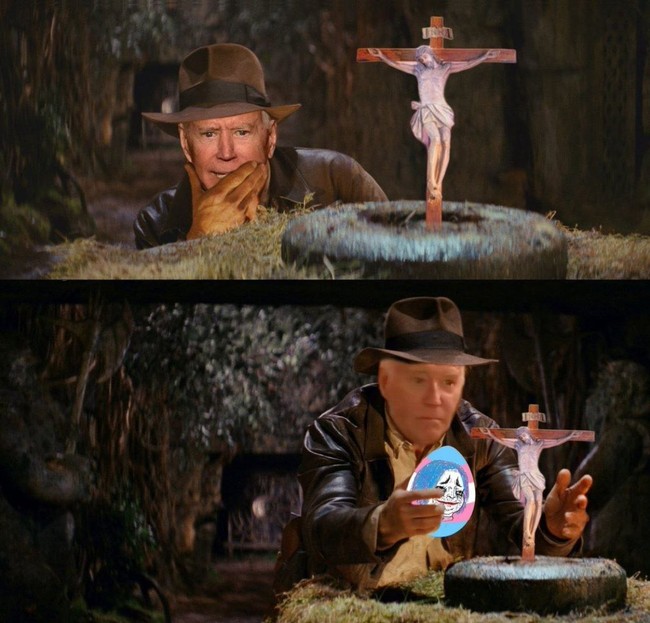If you are a Catholic you are familiar with Divine Mercy Sunday, which falls on the second Sunday of Easter (today).
Saint John Paul II emphasized its importance and ensured that it was made an especially prominent feast day. The technicalities don't matter if you aren't Catholic, but its import in the Catholic calendar is for anybody interested in understanding the core tenets of Christianity.
Divine Mercy Sunday reminds us that at the core of Christianity is the recognition of the inherently fallen nature of humanity. It combines the truth that to be human is to be flawed and that God loves us anyway. We are weak and flawed, but through God redemption is possible for anybody. God loves even the fallen.
3 The teachers of the law and the Pharisees brought in a woman caught in adultery. They made her stand before the group 4 and said to Jesus, “Teacher, this woman was caught in the act of adultery. 5 In the Law Moses commanded us to stone such women. Now what do you say?” 6 They were using this question as a trap, in order to have a basis for accusing him.
But Jesus bent down and started to write on the ground with his finger. 7 When they kept on questioning him, he straightened up and said to them, “Let any one of you who is without sin be the first to throw a stone at her.” 8 Again he stooped down and wrote on the ground.
9 At this, those who heard began to go away one at a time, the older ones first, until only Jesus was left, with the woman still standing there. 10 Jesus straightened up and asked her, “Woman, where are they? Has no one condemned you?”
11 “No one, sir,” she said.
“Then neither do I condemn you,” Jesus declared. “Go now and leave your life of sin.”
Christianity does not teach a "let it all hang out" theology, as Left-Christians now claim. God does want us to live within a prescribed moral framework. The woman caught in an act of adultery was indeed sinning, violating God's law.
Jesus was teaching not that sin was acceptable but that men stoning her was an act of arrogance.
"Go now and leave your life of sin" was Jesus' reaffirmation of God's law, just as his failure to condemn her was a recognition of the possibility of redemption.
It is in this context that I saw this post by the inimitable Laura Loomer, who is not just crazy as a loon, but also a horrible person in need of her own redemption.

The context was Michael Knowles, a strong Catholic, interviewing Nala Ray who has found God and given up her OnlyFans career.
Jesus' message to Nala is surely: "You are welcome in God's house." Loomer's is the social version of stoning: exile."

Some of the most devoted pro-life activists have themselves had abortions. Some of the most powerful evangelists have been horrible sinners who repented. Many Christian saints were among the worst people before conversion.
Condeming evil and embracing forgiveness are not opposites; they are two sides of the same coin. Taking joy in evil acts--evangelizing for evil--requires condemnation not just because it violates God's law but also because it destroys the souls of those who commit these evils. Repenting doesn't only cleanse one's soul, but invites others to do so.
The rejection of "gender-affirming care" by former practitioners--something happening often enough in Europe--is an occasion of joy. Finding God is always a good thing. Living in the truth is something we should always strive for--and invite others into. Repentence isn't just a personal rejection of evil--it is a public reaffirmation of goodness.
Anger at sinners is not incompatible with a willingness to embrace them when they reject their sins. If Marci Bowers, the President of WPATH, awoke one day to realize that she has evangelized for evil and committed himself to opposing it I would shout it to the world. It would be hard to forgive him--we are fallen, after all, and weak in the flesh--but God would I believe call us to embrace the repentant.
Loomer's reveling in hatred for a woman who has repented strikes me as, itself, an embrace of evil. If she is weak and cannot forgive I understand completely; that she calls on all of us to embrace that same weakness strikes me as reprehensible.
Knowles is, in my judgment, completely right to embrace and platform this woman who is now inviting others into God's community. Grace ultimately comes from God, and we all need it. The Pharisees portrayed in John 8:3 were themselves being called into God's grace, and implicitly accepted it by turning their backs on doing evil. Recognizing your own sinfulness is a call for forgiveness.
The ultimate sin is placing yourself above God and God's law. That is what Loomer is doing here.
I am certain Ed could do much better in dealing with the theology here, so forgive me if I have fallen short. But you get the idea.
On to the smiles. Feel free to slag my imperfect theology in the comments!













































BOTB
Canadian Man Too Polite To Tell Doctor He Doesn't Want To Be Euthanized https://t.co/ELwTP06BhB pic.twitter.com/KhLk31ZHZT
— The Babylon Bee (@TheBabylonBee) April 7, 2024
The Babylon Bee Officially Invites Ben Shapiro And Candace Owens To Come Settle Things Like Adults By Sumo Wrestling https://t.co/DkMxHLZ8Cf pic.twitter.com/XQqoKkbFIP
— The Babylon Bee (@TheBabylonBee) April 6, 2024
Mexican Robots Surge Across Southern Border To Take New Fast Food Jobs In California https://t.co/5etWQDn3kI pic.twitter.com/Bn6VGVQQ4M
— The Babylon Bee (@TheBabylonBee) April 6, 2024
China Offers To Send 100,000 Soldiers To Taiwan To Assist With Earthquake Cleanup https://t.co/FQ34eMU5da pic.twitter.com/8gQeaBc3ad
— The Babylon Bee (@TheBabylonBee) April 6, 2024
'I Didn't Do That,' Insists Biden After Aides Ask Him Who Colored On The Wall Of The Lincoln Bedroom https://t.co/YFJ3krDxBa pic.twitter.com/6FSZV3ciW9
— The Babylon Bee (@TheBabylonBee) April 6, 2024
Judge Orders Trump To Stop Noticing That The People Trying To Put Him In Jail Are Democrats https://t.co/OHjYFujh4k pic.twitter.com/ZxaQTz5PaM
— The Babylon Bee (@TheBabylonBee) April 6, 2024
At Manhattan Fundraiser The Boys Reminisce About All The Good Times They Had Together On That Other Island https://t.co/et2vCvmX0S pic.twitter.com/ieNgr4IhOe
— The Babylon Bee (@TheBabylonBee) April 6, 2024
4D Chess: Trump Makes Mar-A-Lago Worth $500 Million By Hanging Up 3 Hunter Biden Paintings https://t.co/bYpVGiZl4o pic.twitter.com/E9paYikWkj
— The Babylon Bee (@TheBabylonBee) April 6, 2024
Democrats Issue Nationwide Fetterman Recall https://t.co/p5k3LTTDVm pic.twitter.com/l8vUwE2WVx
— The Babylon Bee (@TheBabylonBee) April 6, 2024
Kamala Harris Receives Honorary Degree From Clown College https://t.co/pxgDwHhe9A pic.twitter.com/4HEOQQ8OXY
— The Babylon Bee (@TheBabylonBee) April 5, 2024
Bible Scholars Believe Noah Made Over 977 Trips To Home Depot During Ark Construction https://t.co/hRvhqoTc9r pic.twitter.com/abw6Wmd2u0
— The Babylon Bee (@TheBabylonBee) April 5, 2024
Mark Zuckerberg Locked Out Of X Account After Bot Purge https://t.co/TqPNAFnCCg
— The Babylon Bee (@TheBabylonBee) April 5, 2024
TurboTax Rebrands As 'TurboTheft' For Libertarian Market https://t.co/3ZWbPie3j2 pic.twitter.com/RKCNtJTAgG
— The Babylon Bee (@TheBabylonBee) April 5, 2024
Op-Ed: I Know I'm On The Right Side Of History Because Every Corporation In America Agrees With Me https://t.co/D7OMvz8XAk pic.twitter.com/DzPF8uiCnf
— The Babylon Bee (@TheBabylonBee) April 5, 2024
California Starbucks Struggling To Find Robot Workers With Enough Tattoos And Piercings To Work Registers https://t.co/5tk0ZE9JWf pic.twitter.com/c5hEosQ26h
— The Babylon Bee (@TheBabylonBee) April 4, 2024
Teen Thanks Parents For Supporting Him Through That Time Of Confusion But Can He Have His Testicles Back Now https://t.co/rPIylWSsmd pic.twitter.com/DzNkcjYjlf
— The Babylon Bee (@TheBabylonBee) April 4, 2024
Taiwan Kicking Itself For Not Bribing The Bidens https://t.co/JIHuJO78Fh pic.twitter.com/iIQeKGg6ZT
— The Babylon Bee (@TheBabylonBee) April 4, 2024
Adam Waits Patiently As Eve Tries On 23 Different Fig Leaves https://t.co/Bfrt31pPQF pic.twitter.com/1Kr4LPNlxZ
— The Babylon Bee (@TheBabylonBee) April 4, 2024
Democrats Warn Parents To Quickly Transition Their Kids Before They Grow Out Of It https://t.co/oWV0NClQNu pic.twitter.com/moGxc9gWI8
— The Babylon Bee (@TheBabylonBee) April 4, 2024
'AI Is Totally Safe And Development Should Continue Rapidly,' Says Totally Genuine, 100% Human Scientist https://t.co/DnndWOWegd pic.twitter.com/JbHTxuD00l
— The Babylon Bee (@TheBabylonBee) April 4, 2024
After Asking For Preferred Gender Pronouns, Doctor Asks Patient, 'OK, Now What's Your Actual Gender?' https://t.co/OZ0hZZAfgX pic.twitter.com/lEAwxuLTdi
— The Babylon Bee (@TheBabylonBee) April 3, 2024
Female Runner Not Feeling Great About Her Chances Against The Girl With The Beard https://t.co/hXbjeFcw9F pic.twitter.com/xLYVAgAmzK
— The Babylon Bee (@TheBabylonBee) April 2, 2024
You know what comes here...
Pupper says hi to her friends at daycare..🐕🐾👋😍 pic.twitter.com/vq5LGadUGP
— 𝕐o̴g̴ (@Yoda4ever) April 7, 2024
very intimidating pic.twitter.com/6jPXong1vJ
— cats being weird little guys (@weirdlilguys) April 7, 2024
Husky steam engine..🐕🚂😅 🔊⬆️ pic.twitter.com/z5HrKGPwIz
— 𝕐o̴g̴ (@Yoda4ever) April 6, 2024
Turtle just wants to say hi..🐢🐈😅 pic.twitter.com/2ob0H9K6lw
— 𝕐o̴g̴ (@Yoda4ever) April 6, 2024
I changed my mind, give me this one..🐕🐾🍪😅 pic.twitter.com/Tivl8lF5Uu
— 𝕐o̴g̴ (@Yoda4ever) April 6, 2024
Kisses for treat..🐈🐾😍 pic.twitter.com/vA2Q5SKXFM
— 𝕐o̴g̴ (@Yoda4ever) April 6, 2024
Dogs are a gift to mankind pic.twitter.com/PpulYjKUID
— Citizen Free Press (@CitizenFreePres) April 6, 2024
Love it pic.twitter.com/ElWtfYGoIx
— Fun Viral Vids 😊 (@Fun_Viral_Vids) April 6, 2024
Unconditional love ❤️🥰 pic.twitter.com/TikNA04MzF
— 🖤⚔️ 𝑨𝒅𝒂🌹𝑾𝒂𝒓𝒓𝒊𝒐𝒓 ⚔️🖤 (@Btchen_n) April 4, 2024
There're two types of cats..🐈🐾😅 pic.twitter.com/MEsA9GvY3H
— 𝕐o̴g̴ (@Yoda4ever) April 4, 2024
— Doglover (@puppiesDoglover) April 5, 2024
And Finally...
Canadian Doctor Prescribes Euthanasia For Sore Knee pic.twitter.com/czEqicRBTT
— The Babylon Bee (@TheBabylonBee) April 4, 2024








Join the conversation as a VIP Member